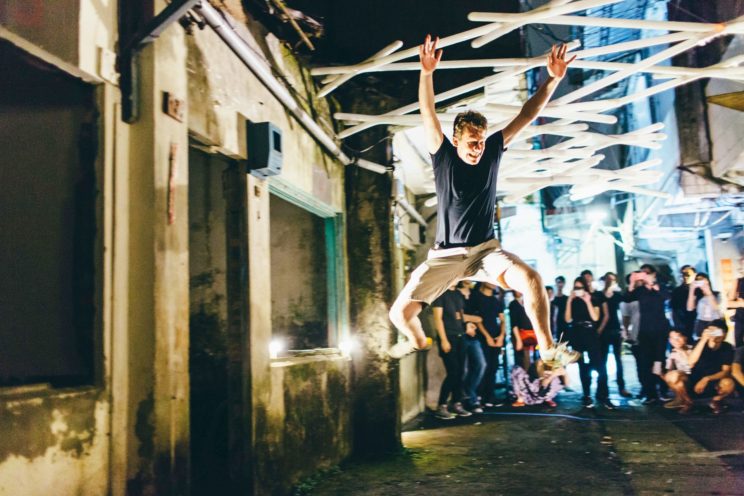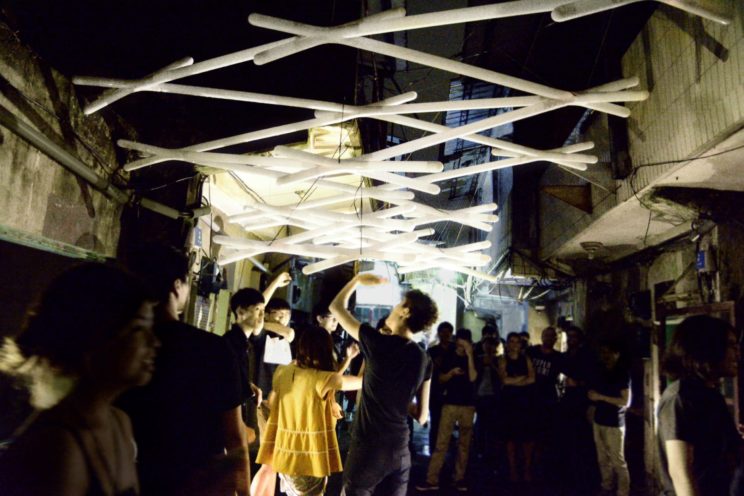Flow is an installation that was produced during a workshop in Space Media Festival Taipei (August 2016), organized by Dezact (UK) and Modern Body Festival (NL). It is the result of the first-time collaboration by an architect and a media artist who developed an integrated conceptual approach for a design methodology and set of material and technology systems for a new work produced on-site.
The workshop and installation departed from a kinesiological understanding of space, where a specific ‘parkour’ movement through the site was traced and translated to guide the overall configuration of a modular installation. Through its formation and interactive lighting, the installation sought to provoke alternative readings on use of urban spaces and invited active participation by visitors, aiming to stimulate movement and flow through the project’s site.
The installation is conceived as a custom designed component system, using plug and play 3D-printed modules connected by polycarbonate tubing of different lengths to create different densities within the overall formation. The nodes contain microprocessors, LED’s and light sensors to enable specific patterns of dynamic lighting behaviours, triggered by movements of the people underneath.
Design coordination: Jeroen van Ameijde & Luis Rodil-Fernández
Design, fabrication and construction assistance: Space Media Festival workshop participants
Interaction design and fabrication: Luis Rodil-Fernández with Howard Chen
3D Printing coordination: Jeroen van Ameijde / Sean Wu / See Chin Liang
Supported by the National Taipei University of Science and Technology (NTUST).
Commissioned for Space Media Festival 2016 (Taipei) and Modern Body Festival 2016 (The Hague).
Interactive installation
Date
December 2-3
Time
12:00 – 20:00
Venue
Pavilloen Baruch (Gemak)
Module
Exhibition
MBF x DEZACT
Weblinks
Jeroen van Ameijde
Luis Rodil-Fernández
Workshop: THEY – Form in motion
BIOS

Jeroen van Ameijde (UK/NL) has been involved with academic activities at the Delft University of Technology, University of Pennsylvania, the AA and many other institutions in various capacities for more than ten years. His current research covers digital design, innovative construction technologies and contemporary urbanism. Summarised under the term ‘generative design’, he investigates new methodologies to incorporate detailed information and simulations of the multiple functionalities of possible design solutions. His research considers the contemporary city as a complex system of interrelated networks of material, social and cultural exchange, using the analogy to natural ecosystems to understand the relationships between physical environments and the enabling of many interactions at different scales and periods of time.

Luis Rodil-Fernández (NL/ES) is an artist, researcher, teacher and hacker. His work is concerned with the impact that technologies have on cognition and the human body with particular emphasis in movement and embodied interfaces. Through performances, installations and social games, his work proposes a critical approach to human-computer interactions rooted in movement. He is part of the Qualified Self project, an international research-creation program that aims at exploring the expressive potential of the new wave of biosensing technologies that are marketed under the moniker of Quantified Self. Luis is also co-founder of Algo Research Systems, a platform for researchers, curators and artists that investigate how the increasing automation of society alters the social order, creates mythical narratives around technologies and subjects the human to systematic automatisms. Luis studied Computer Science in Spain, and earned a BA in the Rietveld Academy in Amsterdam and a Masters in after studying Art Science at KABK in The Hague.


